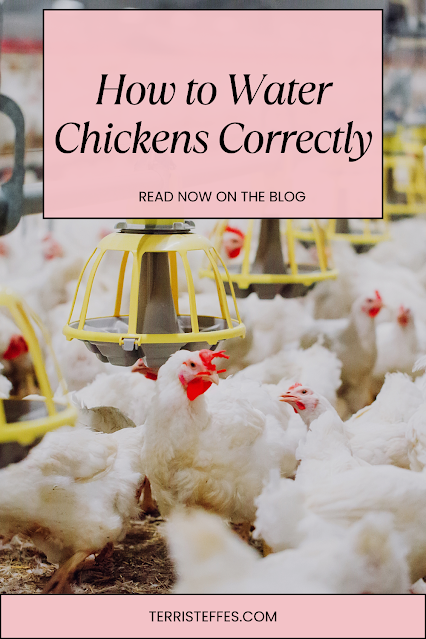Keeping your chickens hydrated year-round is crucial for their health and productivity. Proper
hydration helps maintain their body functions and egg production. Whether you have a small
flock or a larger chicken coop, a reliable chicken waterer is essential to ensure they always have
access to clean, fresh water. This article explores some of the best solutions to keep your
chickens hydrated throughout the year.
Understanding the Importance of Hydration
Hydration is vital for chickens as it affects their overall health, digestion, and egg production.
Chickens can drink up to a pint of water daily, even more in hot weather. Dehydration can lead
to serious health issues, including heat stress, reduced egg production, and, in severe cases,
death. You can help your chickens stay healthy and productive by providing a consistent supply
of clean water.
Choosing the Right Watering System
Selecting the appropriate watering system for your chickens depends on your flock's size and
setup. Here are some standard watering systems and their benefits:
Nipple Waterers: These are great for keeping water clean, as chickens peck at a nipple to
release water. This system reduces the chances of contamination and spillage. It’s ideal for
small and larger chicken coops because it can be scaled up easily.
“Pro Tip”: Some nipples are designed to be freeze-proof, so it pays off to get these if you’re in a
cold climate. Also, a water heater is a very smart investment for the winter months.
Automatic Waterers: These systems are connected to a water source and refill automatically,
ensuring a constant water supply. They save time and effort, making them perfect for busy
chicken keepers. Automatic waterers come in various sizes to suit different flock sizes.
Traditional Waterers: These include gravity-fed waterers and buckets. They are simple and
effective but require regular cleaning and refilling. They are suitable for small to medium-sized
flocks and are easy to set up and maintain.
Keeping Water Cool in Summer
Keeping your chickens’ water cool during the hot summer months is crucial to prevent
dehydration and heat stress. Here are some tips to keep water cool:
Shaded Areas: Place waterers in shaded areas to prevent the water from heating up quickly.
Shade also helps keep your chickens cool while they drink.
Frozen Bottles: Add frozen water bottles to the water. This helps keep the water temperature
down. Replace them as needed to maintain excellent water throughout the day.
Frequent Refills: Change the water frequently to ensure it stays fresh and cool. Chickens are
more likely to drink clean, cool water.
Insulated Waterers: To keep the water cooler for longer, consider using insulated waterers or
wrapping the waterer in reflective material.
Preventing Water from Freezing in Winter
Winter brings the challenge of keeping water from freezing. Here are solutions to ensure your
chickens always have access to liquid water:
Heated Waterers: Invest in heated waterers or bases to maintain water above freezing.
Electric Bucket Deicers: Electric deicers are used for large water buckets to prevent freezing.
Regular Checks: Check waterers daily and refill them with warm water if needed.
Insulated Covers: Use insulated covers or wrap waterers in insulating materials to retain heat.
Ensuring Clean Water
Clean water is crucial for chicken health, preventing diseases and maintaining egg production.
Here’s how to keep water clean:
Regular Cleaning: Clean waterers regularly with mild detergent to remove algae, dirt, and
bacteria.
Elevated Waterers: Place waterers on raised platforms to keep them clean and prevent tipping.
Fresh Water Daily: Provide fresh water daily, even if it looks clean, to ensure it’s free from.
Monitoring Water Intake
Keeping an eye on your chickens’ water intake can help spot any issues early. Here’s what to
watch for:
Consistent Levels: Check the water levels regularly. If you notice a sudden decrease in water
consumption, it could indicate a problem such as illness or stress.
Behavioral Signs: Observe your chickens for signs of dehydration, such as lethargy, pale
combs, or reduced egg production. Address any issues immediately.
Seasonal Adjustments: Chicken water intake can vary with the seasons. They drink more in
the summer and less in the winter, so adjust your watering routine accordingly.
Additional Tips for Hydration
Here are some extra tips to help keep your chickens hydrated:
Electrolytes: In hot weather or during stress, adding electrolytes to the water can help keep
your chickens hydrated and healthy.
Fruit and Vegetables: Offer water-rich foods like watermelon or cucumbers as treats. These
can provide extra hydration and are enjoyed by chickens.
Multiple Watering Stations: In larger coops, provide multiple watering stations to ensure all
chickens have access to water. This helps prevent bullying and ensures even the lowest-
ranking birds stay hydrated.
Conclusion
Keeping your chickens hydrated year-round requires consistent effort and the right tools. You
can maintain your flock's health and productivity by choosing the appropriate watering system,
keeping water cool in the summer, preventing it from freezing in the winter, and ensuring it’s
always clean. Regular monitoring and additional hydration tips can further support your efforts.
With these best practices, you can ensure your chickens in a larger chicken coop stay happy,
healthy, and well-hydrated throughout the year.



Post a Comment